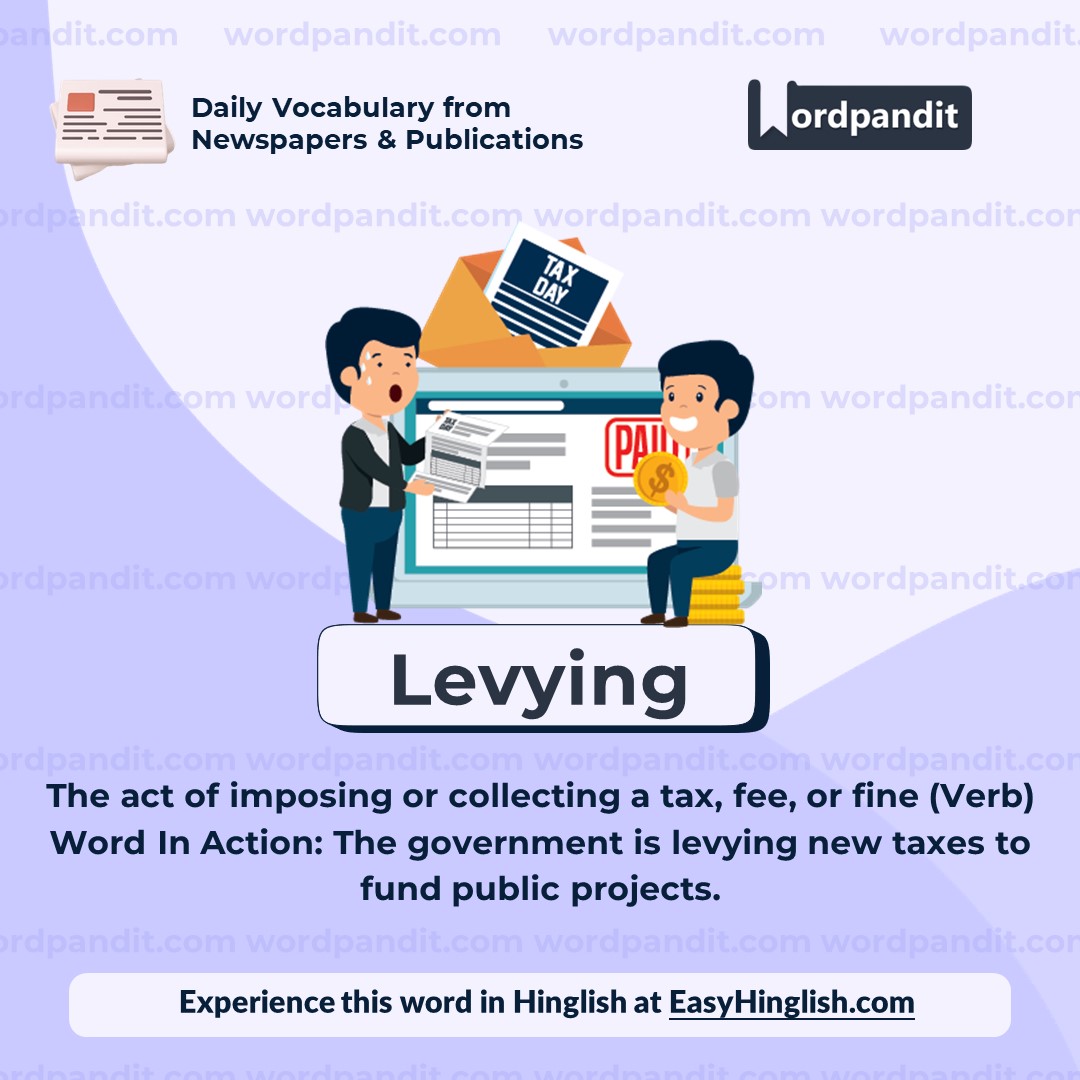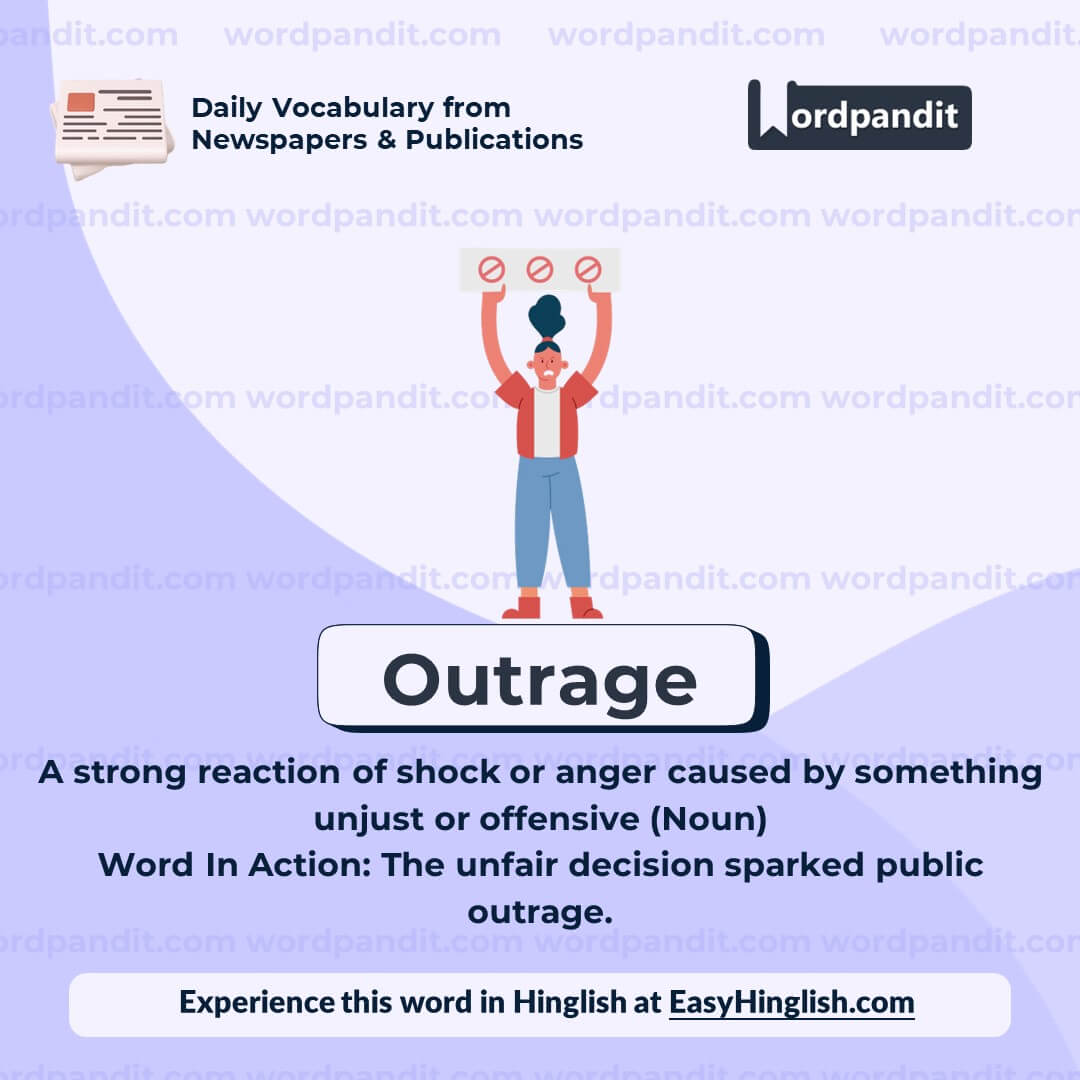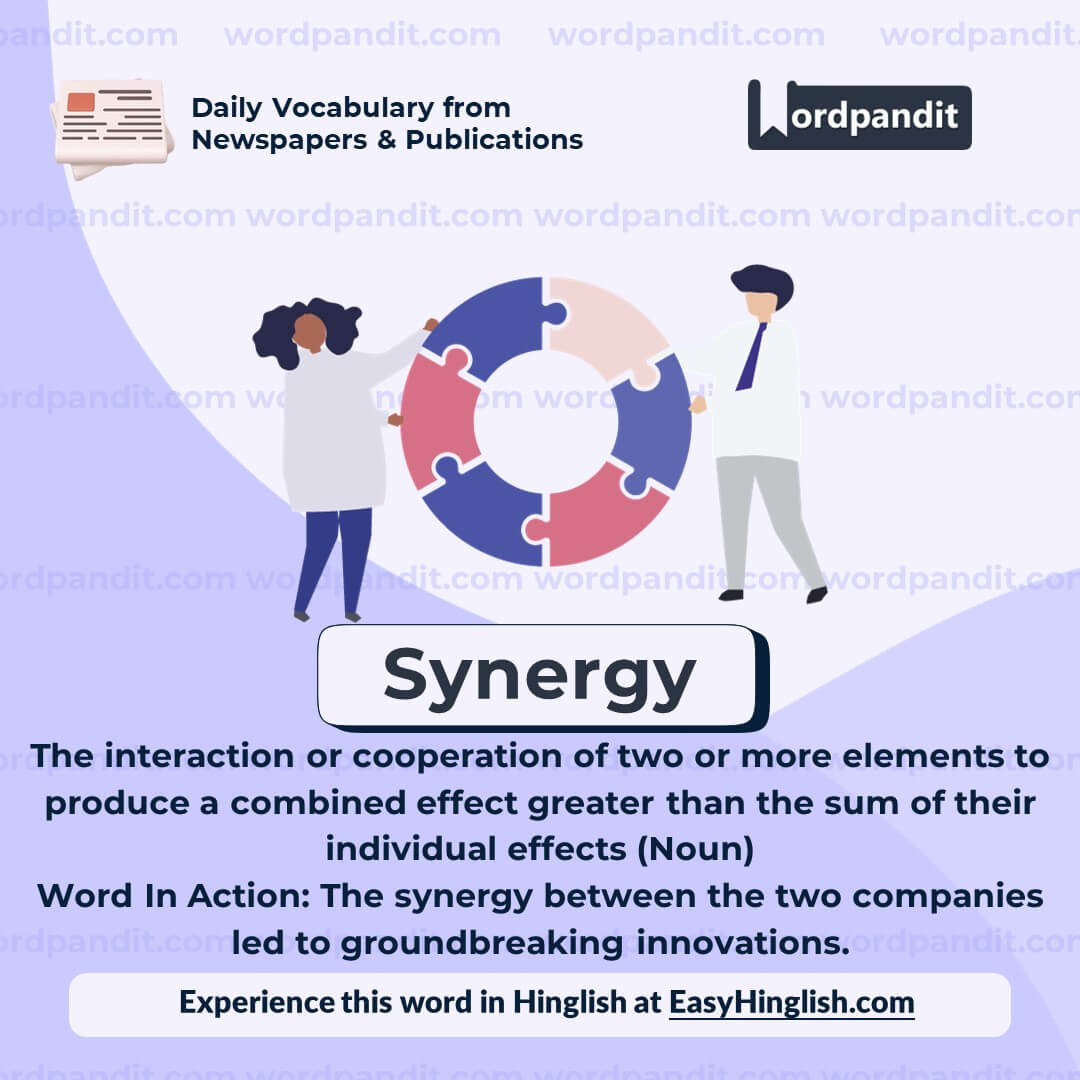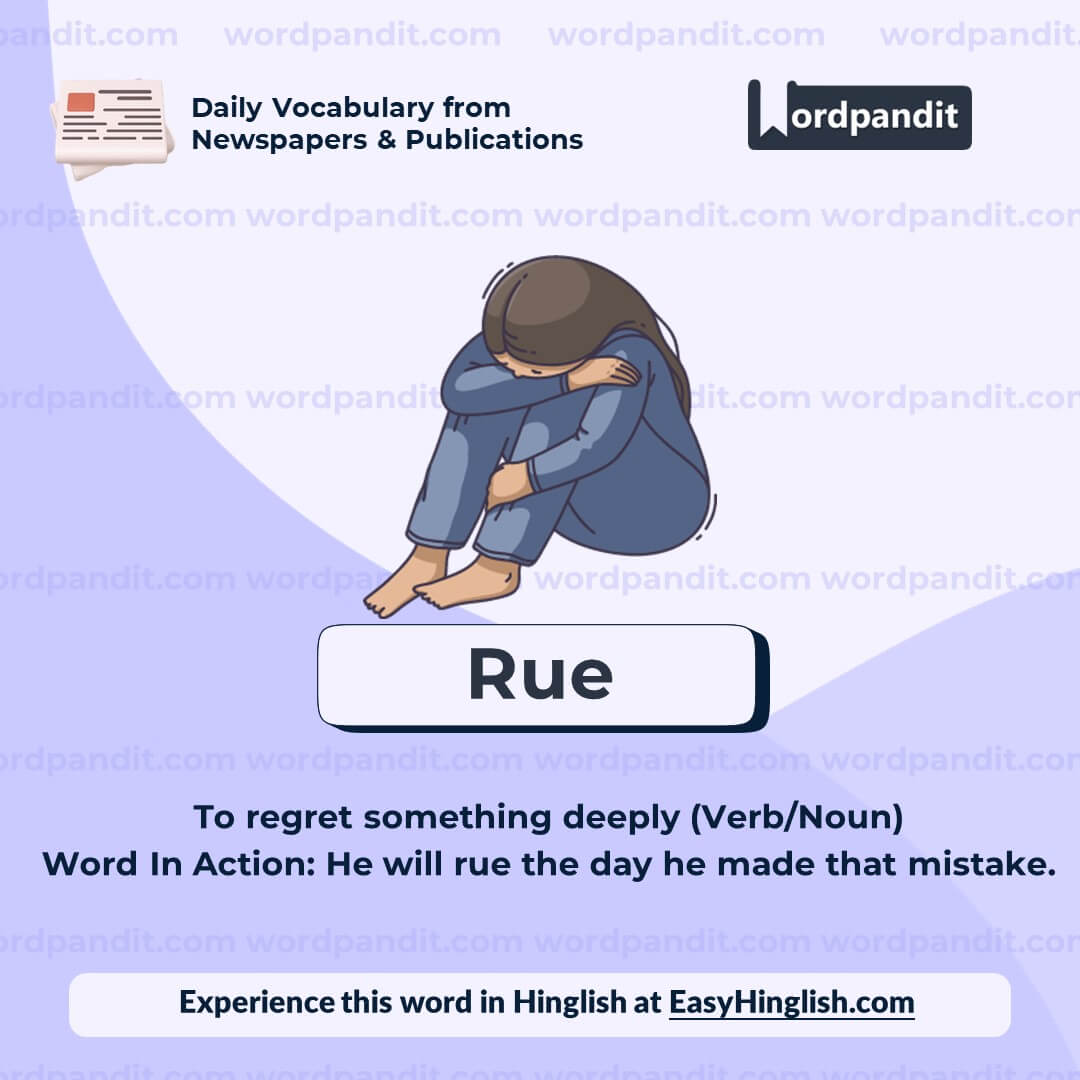Daily Vocabulary from Indian Newspapers and Publications
Welcome to Wordpandit’s Indian Vocabulary Hub
At Wordpandit, we understand the importance of staying rooted in the local context while expanding your language skills. This section focuses on enriching your vocabulary with words and phrases drawn from India’s leading newspapers and publications, ensuring you're learning vocabulary that is practical, relevant, and uniquely Indian.
Why Indian Sources Matter
We believe that the best way to master any language is by immersing yourself in local content. That’s why we carefully curate vocabulary from top Indian publications, including:
- The Hindu
- The Times of India
- The Economic Times
- Hindustan Times
- Live Mint
- The Indian Express
- And many others...
Stay Updated, Stay Relevant
With daily updates from Indian news sources, you’ll be consistently learning words that reflect the trends and shifts in Indian society and culture. Our focus is to provide vocabulary that enhances your understanding of the language in an Indian context.
How Wordpandit Supports Your Goals
Whether you’re preparing for exams, aiming to improve your professional communication, or simply want to stay connected with the latest Indian vocabulary, Wordpandit is here to guide you every step of the way.
Learn with a Practical Approach
Our interactive learning methodology includes real-world examples, engaging activities, and context-specific usage to ensure that every word becomes part of your active vocabulary.
Dive into Indian Vocabulary Today!
Why Choose Wordpandit?
Practical Learning: Focus on words you'll actually encounter in real-world reading, enhancing your comprehension and communication skills.
Diverse Content: From current affairs to scientific breakthroughs, our varied sources expose you to vocabulary across multiple domains.
Effortless Integration: Make Wordpandit a part of your daily routine. Just a few minutes each day can significantly boost your lexicon over time.
Your Path to Vocabulary Mastery
- Visit our Daily Vocabulary section regularly
- Explore new words and their usage in context
- Practice incorporating these words into your own writing and speech
- Track your progress as your vocabulary expands
Start Your Journey Today
Embark on your vocabulary enhancement journey with Wordpandit. By consistently engaging with our daily posts, you'll build a robust vocabulary that serves you well in academic, professional, and personal contexts.
Remember, a word a day keeps linguistic limitations at bay. Make Wordpandit your daily companion in the quest for vocabulary excellence!
WORD-1: Levying
Context:
"ED issues order levying penalty of over ₹3.44 crore on BBC WS India for alleged FEMA violations." - The Hindu
Explanatory Paragraph:
The word "Levying" refers to the act of imposing or collecting a tax, fine, or other mandatory charge. It is often used in legal, financial, or governmental contexts to describe the enforcement of such payments. When an authority levies a charge, it means they have officially ordered its collection.
Meaning: The act of imposing or collecting a tax, fee, or fine. (Verb)
Pronunciation: LEH-vee-ing
Difficulty Level: ⭐⭐⭐ Intermediate
Etymology: Derived from Old French "levée," meaning "a raising" or "collection," which comes from the Latin "levare," meaning "to raise or lift."
Synonyms & Antonyms:
Synonyms: Imposing, Charging, Collecting, Enforcing
Antonyms: Exempting, Waiving, Forgiving, Releasing
Usage Examples:
- The government is levying a new tax on imported goods to boost domestic production.
- The court ruled in favor of levying heavy fines on companies violating environmental laws.
- The municipality has started levying a waste management fee to improve sanitation.
- During wartime, governments often resort to levying additional taxes to fund military expenses.
Cultural Reference:
"No taxation without representation!"—a slogan from the American Revolution, referring to unfair levying of taxes by the British government on the American colonies. This historical event played a major role in the formation of the United States.
Think About It:
Should governments always have the power to levy taxes, or should there be stricter limitations to prevent excessive taxation?
Quick Activity:
Think of three instances where the government or an institution might levy a charge. Write them down and explain why those charges are necessary.
Memory Tip:
Think of "levy" as "lift"—when the government levies a tax, they are "lifting" money from people or businesses.
Real-World Application:
The concept of levying is crucial in financial and legal systems worldwide. It affects businesses, individuals, and international trade. Understanding how and why taxes, fines, or fees are levied helps people make informed financial decisions.
WORD-2: Outrage
Context:
"The recent news about Infosys laying off freshers caused outrage in higher education circles." - The Hindu
Explanatory Paragraph:
The word "Outrage" refers to a strong feeling of shock, anger, or indignation caused by something perceived as unfair, unjust, or offensive. It can be used to describe public reactions to controversial decisions, social injustices, or shocking events. Outrage often leads to protests, criticism, or demands for change.
Meaning: A strong reaction of shock or anger caused by something unjust or offensive. (Noun)
Pronunciation: OW-trayj
Difficulty Level: ⭐⭐ Beginner
Etymology: Derived from Old French "outrage," meaning "excess, insult, or injury," which comes from Latin "ultra," meaning "beyond" or "excessive."
Synonyms & Antonyms:
Synonyms: Fury, Indignation, Shock, Resentment, Uproar
Antonyms: Calm, Acceptance, Contentment, Satisfaction
Usage Examples:
- The decision to cut workers' salaries sparked widespread outrage among employees.
- There was public outrage over the government’s handling of the environmental crisis.
- His offensive remarks caused an outrage on social media.
- The court’s verdict was met with outrage by human rights activists.
Cultural Reference:
The assassination of Mahatma Gandhi in 1948 caused national outrage, leading to mass mourning and a call for unity in India.
Think About It:
Is public outrage always justified, or can it sometimes be based on misinformation?
Quick Activity:
List three recent news events that triggered public outrage. Briefly explain why people were angry.
Memory Tip:
Break it down: "Out" + "Rage" = Rage that comes out strongly when something unfair happens.
Real-World Application:
"Outrage" is frequently used in news headlines, social movements, and political debates. Recognizing this word helps in understanding global issues and the emotions behind public reactions.
WORD-3: Aggravated
Context:
"An FIR has been registered under Section 75(2) of the Bharatiya Nyaya Sanhita (BNS) and Section 10 (aggravated sexual assault) of the Protection of Children from Sexual Offences (POCSO) Act." - Indian Express
Explanatory Paragraph:
The word "Aggravated" is used to describe something that has been made worse or more severe. In legal terms, it refers to offenses or crimes that are more serious due to certain factors, such as the victim’s age, the use of a weapon, or prior offenses by the perpetrator. Outside legal contexts, it can also mean increasing the severity of a situation or causing further irritation.
Meaning: Made worse or more severe; intensified. (Adjective)
Pronunciation: AG-ruh-vay-tid
Difficulty Level: ⭐⭐⭐ Intermediate
Etymology: Derived from Latin "aggravare," meaning "to make heavier," from "ad-" (to) + "gravis" (heavy, serious).
Synonyms & Antonyms:
Synonyms: Worsened, Intensified, Exacerbated, Heightened
Antonyms: Alleviated, Reduced, Lessened, Improved
Usage Examples:
- The suspect was charged with aggravated assault due to the use of a deadly weapon.
- Her constant complaints aggravated the already tense situation at work.
- The new policy aims to reduce pollution, which has been aggravated by rapid industrialization.
- His injuries were aggravated by the lack of immediate medical attention.
Cultural Reference:
In law, many countries differentiate between "assault" and "aggravated assault," where the latter involves additional factors such as intent to cause serious harm or the use of a weapon.
Think About It:
Should crimes always be classified into "basic" and "aggravated" categories, or does this make legal decisions more complex?
Quick Activity:
Think of three real-life situations where a problem can be aggravated by external factors. Write them down and explain how they become worse.
Memory Tip:
Think of "Aggravated" as "Adding Gravity"—when something is aggravated, it becomes heavier or more serious.
Real-World Application:
The term "aggravated" is widely used in law, medicine, and everyday situations. Understanding this word helps in legal discussions, medical diagnoses, and describing worsening conditions in daily life.
WORD-4: Synergy
Context:
"The future of programming education lies in the synergy between automated assessment platforms and human evaluation." - The Hindu
Explanatory Paragraph:
The word "Synergy" refers to the combined effect of two or more elements working together to produce a greater outcome than if they were acting separately. It is commonly used in business, science, and technology to describe successful collaboration or integration that enhances efficiency and results.
Meaning: The interaction or cooperation of two or more elements to produce a combined effect greater than the sum of their individual effects. (Noun)
Pronunciation: SIN-er-jee
Difficulty Level: ⭐⭐⭐ Intermediate
Etymology: Derived from the Greek word "synergos," meaning "working together," from "syn-" (together) and "ergon" (work).
Synonyms & Antonyms:
Synonyms: Collaboration, Cooperation, Alliance, Integration
Antonyms: Isolation, Separation, Division, Conflict
Usage Examples:
- The synergy between artificial intelligence and human expertise is revolutionizing healthcare.
- The merger created a synergy that boosted both companies' market share.
- The team's synergy helped them complete the project ahead of schedule.
- The synergy between theory and practice is essential for effective learning.
Cultural Reference:
The business world frequently discusses "synergy" in relation to mergers and acquisitions, where companies combine their strengths to increase profitability and efficiency.
Think About It:
Can too much synergy between organizations or individuals lead to overdependence and lack of innovation?
Quick Activity:
Think of a famous partnership (in business, sports, or entertainment) where synergy played a key role. Describe how their collaboration led to success.
Memory Tip:
Think of "Synergy" as "Synchronizing Energy"—when things work together in harmony, they create a powerful effect.
Real-World Application:
"Synergy" is a crucial concept in teamwork, corporate strategy, and technological advancements. Recognizing its importance helps in business planning, research collaborations, and personal productivity.
WORD-5: Rue
Context:
"He would live to rue his hasty decision as it led to unforeseen complications." - The Hindu
Explanatory Paragraph:
The word "Rue" means to deeply regret or feel sorrow over something, especially a past action or decision. It is often used when someone realizes the negative consequences of their choices. The phrase "live to rue" is commonly used to express that someone will eventually regret a certain action.
Meaning: To regret something deeply. (Verb/Noun)
Pronunciation: Roo
Difficulty Level: ⭐⭐ Beginner
Etymology: Derived from Old English "hreowan," meaning "to make sorry" or "cause distress."
Synonyms & Antonyms:
Synonyms: Regret, Lament, Repent, Bemoan
Antonyms: Rejoice, Celebrate, Applaud, Welcome
Usage Examples:
- She will rue the day she turned down such a great opportunity.
- The athlete rues his decision to ignore his coach’s advice after losing the match.
- He ruefully admitted that his stubbornness had cost him his job.
- The criminal rues his actions now that he is serving a life sentence.
Cultural Reference:
Shakespeare often used the word "rue" in his plays. In "Macbeth," Lady Macbeth might have "rued" her ambition when it led to her downfall.
Think About It:
Can regret be a positive emotion if it helps someone learn from their mistakes?
Quick Activity:
Think of a time when you made a decision you later rued. What did you learn from it?
Memory Tip:
Think of "Rue" as "Ruined"—when you make a mistake, you might feel like you've ruined something, leading to regret.
Real-World Application:
"Rue" is often used in literature, speeches, and emotional expressions. Knowing this word helps in expressing regret in a powerful way.

















